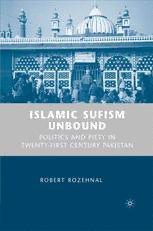
Islamic Sufism Unbound: Politics and Piety in Twenty-First Century Pakistan PDF
Preview Islamic Sufism Unbound: Politics and Piety in Twenty-First Century Pakistan
slamic ufism nbound I S U slamic ufism nbound I S U olitics and iety in wenty- irst P P T F entury akistan C P Robert Rozehnal Palgrave macmillan * ISLAMIC SUFISM UNBOUND Copyright © Robert Rozehnal, 2007. Softcover reprint of the hardcover 1st edition 2007 978-1-4039-7567-6 All rights reserved. No part of this book may be used or reproduced in any manner whatsoever without written permission except in the case of brief quotations embodied in critical articles or reviews. First published in 2007 by PALGRAVE MACMILLAN'M 175 Fifth Avenue, New York, N.Y. 10010 and Houndmills, Basingstoke, Hampshire, England RG21 6XS Companies and representatives throughout the world. PALGRAVE MACMILLAN is the global academic imprint of the Palgrave Macmillan division of St. Martin's Press, LLC and of Palgrave Macmillan Ltd. Macmillan® is a registered trademark in the United States, United Kingdom and other countries. Palgrave is a registered trademark in the European Union and other countries. ISBN 978-0-230-61896-1 ISBN 978-0-230-60572-5 (eBook) DOI 10.1007/978-0-230-60572-5 Library of Congress Cataloging-in-Publication Data is available from the Library of Congress. A catalogue record for this book is available from the British Library. Design by Newgen Imaging Systems (P) Ltd., Chennai, India. First edition: August 2007 10 9 8 7 6 5 4 3 2 1 Transferred to Digital Printing 2009 ontents C List of Illustrations vii Acknowledgments ix Introduction: Mapping the Chishti Sabiri Sufi Order 1 1 Sufism and the Politics of Islamic Identity 19 2 Muslim, Mystic, and Modern: Three Twentieth-Century Sufi Masters 39 3 Imagining Sufism: The Publication of Chishti Sabiri Identity 89 4 Teaching Sufism: Networks of Community and Discipleship 129 5 Experiencing Sufism: The Discipline of Ritual Practice 173 Conclusions 227 Notes 231 Bibliography 257 Index 269 ist of llustrations L I Figures I.1 Women Dancing in Ecstasy at the Shrine of 'Ala ad-Din 'Ali Ahmad Sabir (d. 1291), Kalyar Sharif, India 2 1.1 The Shrine of Baba Farid ad-Din Mas'ud Ganj-i Shakkar (d. 1265), Pakpattan, Pakistan 25 2.1 The Shrine of Shaykh Shahidullah Faridi (d. 1978), Karachi, Pakistan 61 2.2 The Shrine of Shaykh Wahid Bakhsh Sial Rabbani (d. 1995), Allahabad, Pakistan 75 5.1 The Shrine of Shaykh Isma'il 'Abd al-Qadir Thani, Pulau Besar, Malaysia 201 5.2 Qawwali Singers at the 2001 'ursFestival of Wahid Bakhsh Sial Rabbani, Allahabad, Pakistan 213 Map 1.1 Map of Pakistan 20 cknowledgments A T he field research for this study was supported by a fellowship from the International Dissertation Field Research Fellowship Program of the Social Science Research Council, with funds provided by the Andrew W. Mellon Foundation. Additional funding was provided by fellowships from the American Institute of Pakistan Studies, and Duke University’s Graduate School and Center for International Studies. The writing stage was funded by a Charlotte W. Newcombe Doctoral Dissertation Fellowship, and Franz and Class of 1968 Fellowships from Lehigh University. I am extremely grateful to all these institutions for their generous support. This project would not have been possible without the kindness, coopera- tion, and hospitality of many Chishti Sabiri disciples in both Pakistan and Malaysia. I thank them all and sincerely hope this book honors their tradition. I owe a special debt of gratitude to a host of friends in Pakistan: Dr. Mansoor Hashmi and family, Tahir Maqsood and family, Lubna Shah Anwar and family, Moinuddin Hashmi, Jawwad and Bina Khwaja and family, Suroosh Irfani, Rashida Hamid, Aamir Ali, Yawer Ansari, Shaffaq and family, Muhammad Razzaq, Mushtaq Muhammad, Shahnaz Hassan and family, Riaz Ibrahim and family, Irfan Khan, Madni and family, Tariq Nazir, Altaf Siddiqui and family, Bilal, Muhammad Haroon Riedinger, Masood Hasan, Abdul Razzaq, Muhammad Saalim Shaheedi, Fayyaz Hussain Gilani and family, Tehzeeb un-Nissa Aziz, Saleem and Humaira Aziz and family, Gulfizah Afzal Khan, Ayesha Salam, Salma Khan, and Asadullah Sumbal. In the end, I am solely responsible for the views, as well as the mistakes, expressed in this work. Even so, I want to acknowledge the influence of many wonderful colleagues and friends whose insights and encouragement helped bring it to life. In its earliest stages this project was shaped by my doctoral dis- sertation committee at Duke University—a unique group of scholars repre- senting three institutions and three academic disciplines: Professors Carl Ernst (University of North Carolina-Chapel Hill), Katherine Ewing (Duke University), David Gilmartin (North Carolina State), Bruce Lawrence (Duke University), and Ebrahim Moosa (Duke University). I thank them all for their enthusiasm, patience, and unfailingly constructive criticism. I am espe- cially indebted to Carl Ernst for opening the door to this research and to Bruce Lawrence for skillfully guiding it to completion. Among the many others whose wisdom and insight contributed to this work I would especially like to thank Vincent Cornell, Omid Safi, Scott Kugle, Kecia Ali, Rick Colby,
